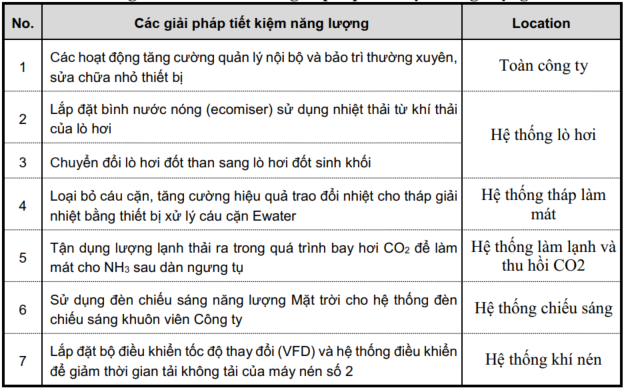HABECO ID: From concept to investment project that cuts CO2 emission by 15,8%
Thứ sáu, 01/08/2025 - 11:06
As Vietnam accelerates its green transition and moves towards net-zero target, economical and efficient use of energy is identified as a crucial solution to meet this target.
The industrial sector, which accounts for nearly 50% of the country's total energy consumption, is under significant pressure to find opportunities and solutions for energy efficiency. The beer sector, in particular - with its high thermal and electrical energy consumption - offers significant opportunities for energy savings.
The case of a brewery under the Hanoi Beer Alcohol and Beverage Joint Stock Corporation (HABECO) is a notable example of green transformation in the sector. With technical support from the Energy Partnership Program between Vietnam and Denmark (DEPP3), the plant conducted a high-quality energy audit and identified feasible solutions that bring multiple benefits in energy efficiency, emissions reduction, and economic performance. Most notably, the enterprise moved straight from audit results to action, investing in one solution, which helped reduce total CO₂ emissions by nearly 15.8%.

From concept to investment project
Located in Hung Yen, the HABECO ID brewery operates using German and Japanese technologies, with its main products being draught and canned beer. In 2023, the plant’s output reached nearly 380,000 hectoliters. Total energy consumption exceeded 17 million kWh - of which 76.5% was from coal-fired heat and the remaining from electricity - and total emissions surpassed 6,207 tons of CO₂ annually.
DEPP3 experts conducted a comprehensive onsite assessment of all major energy-consuming systems, including boilers, compressed air, and refrigeration, to identify high-potential energy efficiency solutions. Based on energy flow mapping and specific energy consumption analysis, the team proposed seven category A solutions - those deemed highly feasible in terms of technical, financial, and environmental viability.
Priority solution: Replacing coal-fired boilers with biomass boiler
Among the 07 proposed solutions, the most feasible and impactful solution was to replace all outdated coal-fired boilers with a high-efficiency 6-ton biomass boiler. With a total investment of VND 15 billion and a payback period of under 5 years, this solution is projected to reduce annual CO₂ emissions from 6,207 tons by over 980.5 tons per year - equivalent to a reduction of nearly 15.8% in the plant's total emissions.
With specific calculations, the solution convinced the plant's management board to proactively invest in its implementation immediately after the energy audit. This underscores HABECO’s strong commitment and the enterprise’s confidence in the quality of the report results provided by DEPP3.

A consolidated list of 07 category A solutions extracted from the energy audit report. (Source: DEPP3)
In addition, the plant has incorporated the remaining six category A solutions into its action plan for 2024 - 2026. Measures with lower costs, high efficiency, and quicker returns will be prioritized in the earlier phases.
Preliminary calculations suggest that full implementation of all category A solutions could help the company save approximately 250,090 kWh of electricity and 587.9 tons of coal per year - translating to 1,274.5 tons of CO₂ emissions avoided and nearly VND 4 billion in cost savings.
Beyond energy savings and emission reductions, the measures will also bring visible non-energy benefits, including: more stable system operation, reduced dust, smoke, and air pollution, optimized production processes through savings on labor and maintenance costs, which extends equipment lifespan.

Old coal-fired boiler (left) and new biomass-fired boiler. (Source: DEPP3 Program)
From a pilot case to scalable impact
The case of HABECO ID demonstrates how a data-driven, methodical approach can turn a promising idea into a real investment project - something not all energy audits manage to achieve. It also provides a replicable model for other breweries with similar technology and production processes.
Moreover, the international standard energy audits conducted under DEPP3 Program have shown that energy-intensive industries hold substantial potential for energy savings – not only in boiler, compressed air, or refrigeration, but also in core production processes. This highlights the wide applicability of similar solutions beyond the beer sector.
HABECO ID’s story is a testament to the fact that when enterprises are supported with high-quality technical assistance, comprehensive methodologies, and scientifically sound data, they are more likely to be confident and make quick investment decisions.
DEPP3 Program